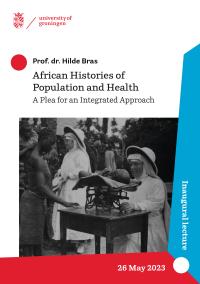African Histories of Population and Health: A Plea for an Integrated Approach
Synopsis
Integrated approach needed to understand colonial legacy for demographic developments
In order to understand the causes of population developments in Africa, it is necessary to examine the influences of the colonial era on the different parts of the continent. This is what Hilde Bras advocates in her inaugural lecture on Friday, May 26. She argues that the analysis of population figures – the field of historical demography – should go hand in hand with a more detailed study of medical and nursing practices – the field of medical and health history.
The world's population has recently passed 8 billion people. Although growth is slowing, numbers will continue to rise at least until the end of this century. Most of this growth will take place in sub-Saharan Africa. Africa's population has increased from 179 million in 1950 to 1.2 billion today, and is expected to grow to 4 billion by 2100, a more than twenty-fold increase in 150 years. Not only this remarkable growth of the total population must be explained, but also the considerable variation therein across different parts of the continent.
In her inaugural lecture, Bras argues that a long-term vision is essential to better understand population developments in Africa in all their variation. Understanding the influence of colonial governance and the Christian mission is necessary to explain the demographic transitions. This roughly concerns the period between the end of the nineteenth century and the beginning of the sixties, when most African countries were under European rule.
Professor Bras advocates an integrated approach that combines the fields of 'historical demography' and the 'history of medicine, health and healing'. Figures acquire more analytical value when they go together with a more qualitative analysis of new sources such as mission diaries, interviews and photography through which the African inhabitants of the continent and their views on health and reproduction are given a voice and a face.
Design and layout: LINE UP boek en media bv | Riëtte van Zwol, Mirjam Kroondijk
Cover photo: Leopoldville. Milk depot and baby clinic, n.d. (AP.0.1.3617,
collection RMCA Tervuren, CC BY-NC-SA 2.0 BE)
Author photo: Firien Dubben
Illustrations: Author, if otherwise noted
Published by University of Groningen Press
Broerstraat 4
9712 CP Groningen
https://ugp.rug.nl/
Downloads

Downloads
Published
Series
Categories
License

This work is licensed under a Creative Commons Attribution-NonCommercial-NoDerivatives 4.0 International License.




